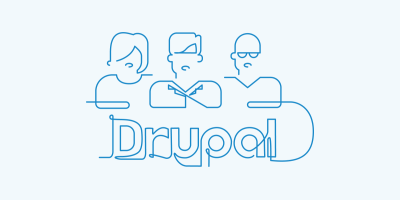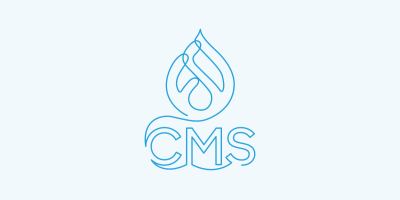Setting the Record Straight on Pantheon vs. Acquia

Pantheon has a dedicated page on its website that compares its product to Acquia. The claims are often not only misleading but flat out wrong. We at Acquia have some of the best Drupal-optimized solutions, and we’re willing to prove it. You, of course, should come to your own conclusions, but we want to ensure you have the facts straight first.
Let’s start at the most basic (but arguably most important) place: Drupal.
Commitment to Drupal
Drupal creator Dries Buytaert co-founded Acquia, and to this day, Drupal remains at the core of what the company does. In fact, Acquia is the number one contributor to the open source content management system, having contributed 17.7x more code to Drupal than Pantheon did in 2020–2021.
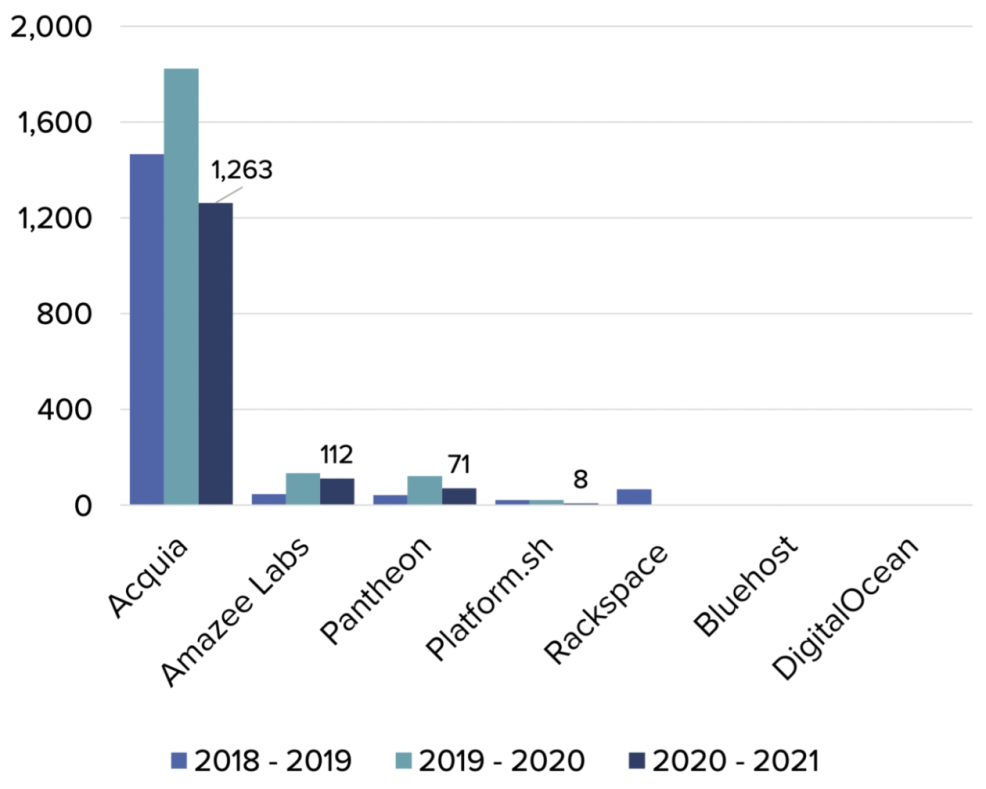
Then there’s the question of supporting major Drupal versions once they’re generally available or after they’ve reached their end-of-life. Acquia offers extended support for Drupal 7 (D7), which will sunset in on January 5, 2025. Pantheon does the same, but there’s a catch: The company’s D7 extended support is only available if the site is on PHP 8.0 or 8.1.
While Drupal 7 will support the newest versions of PHP, many of the contrib modules won’t support higher than PHP 7.4. That caveat requires a PHP upgrade if the organization is running on PHP 7.4. Acquia, on the other hand, offers free PHP 7.4 extended support until April 2025 for Drupal 7 users.
Acquia vs. Pantheon: Where Acquia and Pantheon go head to head
No doubt about it: Drupal is at the heart of Acquia, but what about the difference in platforms?
Hosting performance
To meet high traffic needs, growth, and performance goals, we offer a 99.99% service-level agreement (SLA) uptime. Pantheon also lists their SLA uptime as 99.99% but only for their “Elite” hosting tier. Additionally, the company only offers 99.95% uptime SLA unless you purchase its multi-zone failover add-on. A guaranteed uptime as part of your SLA tells you how reliable your provider is and whether you can expect your experience to be available to visitors.
Acquia also offers multi-zone availability to all customers for no additional charge. In addition, we offer multi-region failover clusters and disaster recovery services, while Pantheon offers multi-zone failover for elite sites only (but does provide disaster recovery services to all).
Disaster recovery services and multi-zone failover ensure that your digital experiences will be performant and that they’re backed up if a disaster occurs. Solutions that make your site resilient are key to knowing that it will always be available.
A content delivery network (CDN) is another performance factor because it ensures fast site speed. Pantheon addresses this with its Global CDN that has 40+ points of presence (POPs). For an additional fee, the company also offers an advanced CDN. Acquia, on the other hand, has Platform CDN built in with 65+ POPs, and unlike Pantheon, we also offer a more advanced CDN solution — Acquia Edge — with 200+ POPs at an additional cost. These differences are important, because more POPs allow a greater number of technical staff to access your site(s) to ensure availability.
A platform that doesn’t perform is unacceptable. Customers won’t wait for an experience that loads slowly, so organizations need a trusted platform provider who can deliver the features and solutions that support their platform every time.
But beyond performance, organizations need tools to deliver a compelling digital experience. What aspects of solutions are the most important?
Security
When it comes to securing your digital experience, the protections vary based on an organization’s needs. Every organization needs to think about security, especially with the rising number of security threats that digital experiences face. A secure experience reassures customers that they’re not putting themselves or their data at risk when interacting with your brand.
Acquia Cloud Platform comes with a vast compliance portfolio including FedRAMP, HIPAA, SOC 1, SOC 2, PCI, GDPR, and more. In comparison, Pantheon offers limited compliance standards — just SOC 2 and GDPR. This difference matters because many organizations need to meet industry standards. Without compliance accreditations, organizations can’t meet those standards.
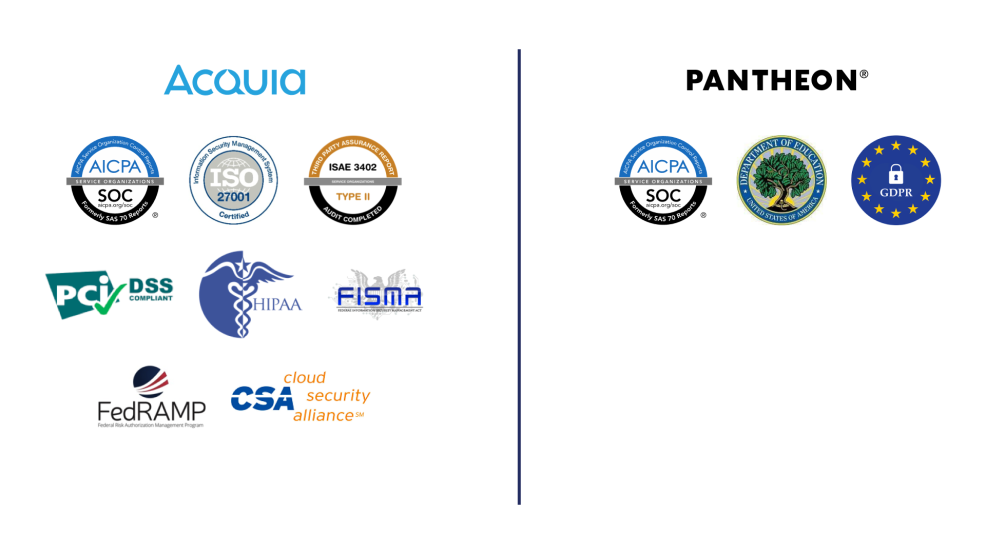
Acquia Edge Security also offers a number of advanced security offerings, such as advanced web access firewalls (WAF). Pantheon offers a basic WAF but no advanced security offerings like reputation scanning. The difference in WAF offerings matter because a WAF protects web applications from a variety of application-layer attacks. With a basic WAF, your experience won’t be protected from advanced threats.
Security is made up of several different components. Compliance and WAF make up a small portion of those components. To see a full comparison of security features, check out our comparison table.
Developer tools
Developer tools mean a shorter set-up time, less maintenance, and more efficiency and agility.
Acquia provides an end-to-end web platform optimized for Drupal development with automated DevOps tools including Acquia Code Studio, Acquia Cloud IDE, and Acquia Cloud Actions, a feature of Acquia Cloud Platform. Code Studio accelerates and optimizes users' Drupal development workflows. With an integrated toolset, development teams no longer need to maintain integrations or complex toolchains. Cloud IDE is a preconfigured, cloud-based development environment that’s ready to go out of the box (OOTB). With no manual tasks, code, or command line required, you can dependably automate deployment processes and improve governance of shared code with Cloud Actions. In partnership with GitLab, Acquia unifies each step of a development workflow.
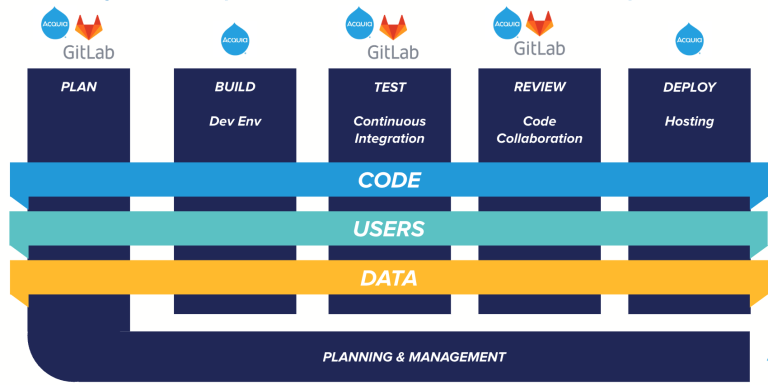
For the planning stage, Code Studio includes issue management tools, while Cloud IDE allows developers to build their experience from anywhere. For the build stage, Cloud IDE comes preconfigured with debugging tools, allowing developers to rapidly identify and resolve bugs. Code Studio also supports the testing stage by offering pipelines OOTB, as well as tests for audit dependencies, vulnerabilities, and code quality. In the review stage, users can visually review code changes, post comments, and assign approvers. Once the code changes have passed their tests and the maintainer has approved the changes, we can merge the code changes and move to the final stage. In the final stage — deployment — Cloud Actions performs common DevOps tasks automatically from the Cloud Platform UI.
Pantheon, on the other hand, doesn’t offer a complete end-to-end web platform and requires integrations from countless tools and services to achieve a seamless DevOps workflow. The company offers LocalDev, which reaches its end of life in June, for the build stage, but it has a complex set up. For the deployment stage, Pantheon offers Upstreams and version control. Without solutions at all five stages of the development workflow, developers are left to either complete the work on their own or build solutions to support them.
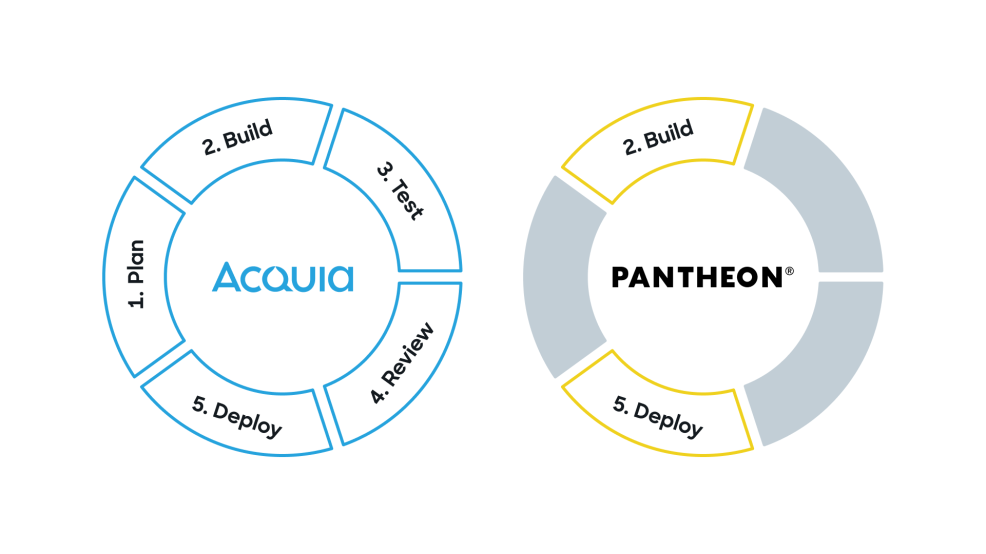
Acquia’s suite of developer products enable users to eliminate development silos and create a holistic DevOps workflow from end to end. With Acquia, users get to market faster with efficient and streamlined processes for each step of the DevOps workflow. Users can eliminate risk with security testing and governance features, as well as improve code quality with a full testing suite optimized by Drupal experts with built-in best practices out of the box. Best of all, everything is integrated with Cloud Platform, so you can start using it today with Acquia-hosted Drupal applications.
Multisite
Delivering a multisite digital experience can be complex. The most important factor is selecting a platform that can support the best solution for you. The Acquia platform supports three approaches to managing multiple sites: Drupal's out-of-the-box multisite feature, Acquia Site Factory, and Acquia Code Studio. In contrast, Pantheon doesn’t support Drupal multisite and only offers one option for managing multiple sites with Custom Upstreams.
What is Drupal multisite? It’s the CMS’s ability to manage multiple websites from a single Drupal installation. With Drupal multisite, users can create and manage multiple websites efficiently while benefiting from the flexibility and scalability of Drupal.
The next approach to managing a multi-site experience is Acquia Site Factory, a centralized platform that quickly builds, manages, and updates a portfolio of sites. Including built-in single sign-on (SSO) integration, it also simplifies governance by managing users through the same centralized dashboard.
Our third offering for multisite management is Acquia Code Studio. Code Studio accelerates production with a complete toolset that enables teams to plan, build, test, review, and deploy from a single, customizable workflow. Using a Composer-based workflow, Code Studio can provide centralized code governance across many sites that don’t follow the same structure, codebases, or, in some cases, architectures.
Pantheon’s offering for multisite management is very different from Acquia’s. Pantheon Custom Upstreams offers a template as a starting point for creating new websites using a Git workflow. Users can create their own custom upstreams by configuring a Drupal installation with their desired modules, themes, and settings and then save it as a new upstream. Unlike Code Studio, which uses a Composer-based workflow that relies on semantic versioning, a Git-based workflow can only be updated to use the latest from the upstream. Changes from the upstream have to be merged into all sites, while Code Studio can specify a different version if the downstream sites aren’t ready for the updates.
Pantheon promotes Custom Upstreams as a utopia for managing numerous sites, but that's because they only have one solution. In contrast, Acquia believes a "one-size-fits-all" approach doesn't work for everyone. Instead, we explore a customer's unique need and tailor a solution that works best for them.
Marketing tools
Multiple teams contribute to the delivery of digital experiences. Organizations don’t have to provide solutions for their marketing teams, but doing so does reduce the number of requests the developer team receives. Empowering marketing teams to update and create content on their own saves time and resources for organizations.
Our response is Acquia Site Studio, a low-code tool for building and updating pages. Pantheon doesn’t offer tools for marketing or marketers. Rather, they talk about the value of Drupal and how Drupal can enable your marketing team.
Customer support
From advanced security to low-code tools, your organization can empower every team to work independently. Solutions can’t support themselves, though. Organizations need support for Drupal, their solution, and their application.
All organizations need vendors to provide excellent customer support. Mistakes happen, and things go wrong, but a good customer support team helps you bounce back quickly and return to peak performance.
Drupal expertise is particularly important for organizations that deliver a Drupal experience. To that end, Acquia has 150+ Drupal experts on hand; Pantheon only has that as an add-on to their diamond-level support package.
Then there’s solution support. Pantheon outlines its support offerings, but emergency on-call support is only available at the platinum and diamond levels. Acquia’s support from on-call experts is available to everyone. Additionally, Acquia’s current average response time for critical tickets is 3.5 minutes globally.
Unlike Acquia, Pantheon does offer chat support 24/5 — but only with its Silver package, and support goes up from there. Keep in mind that users have found the company’s support services wanting, too.
There are also more advanced versions of support. Acquia and Pantheon both offer professional services that will finish development work for organizations without in-house support but at cost. Acquia also offers a technical account manager (TAM) to assist with support and dev needs, but it comes with a price tag. Pantheon, on the other hand, doesn’t mention a TAM offering in its documentation.
Application support is an additional form of support. Without application support, organizations are on their own in determining their application development and installation needs. Acquia offers application support, but Pantheon doesn’t.
Customer support is an important factor when determining who your organization will select to meet the needs of its digital experience. In fact, some argue that support can either make or break your digital experience when it’s on the line. The level of support your organization needs depends on the skills and background of your technical team, but everyone needs support at some point.
Pricing
Pricing can be confusing and can bring up many questions. What does the solution cost? Why is it so expensive? Or, conversely, why is it so cheap? What am I even paying for? What am I not paying for? And, arguably, the most important: Is the value worth the cost?
But there’s more to cost than a price tag; support, implementation time, and customization are examples of other critical elements. Pantheon lists its packages, but to access the company’s enterprise-grade offering, you have to talk to a company rep directly.
In comparison, Acquia implemented simple packages that scale to meet traffic requirements and feature needs. We want to make sure we build a package that fits your organization’s needs and includes solutions that meet all your teams’ goals. So, while we don’t list our pricing, our team is more than happy to meet with you to build a customized package and quote a price in line with your needs.
But to return to the #1 question: Is the value worth the cost? Of course, you could go with a more budget-friendly option when purchasing literally anything — but you get what you pay for. So, when considering Acquia and Pantheon side by side, based purely on dollars, Acquia solutions are more expensive — but organizations also get more for their money, like superior hosting performance, Drupal expertise, solutions for marketers, and more.
Acquia’s commitment to Drupal makes Acquia the premier Drupal company. We offer a platform solution with built-in performance features that meets customer needs. From Drupal hosting to dev environments in the cloud and low-code marketing tools, Acquia provides state-of-the-art solutions that empower organizations to deliver exceptional digital experiences while enjoying world-class customer support.
Acquia was also named a leader in the Gartner DXP Magic Quadrant and the Forrester Agile CMS Wave reports; Pantheon didn’t rank in either. Recognized as a trusted leader by multiple analysts isn't the only factor when deciding who your hosting provider should be, but it can be a crucial one. This and the other items outlined above are still just parts of the equation; value is also determined by the worth that teams find in the solutions.
Price is just one element to weigh when selecting and implementing a hosting solution, and sometimes budget simply can’t be overlooked. Even so, an organization should consider how a solution can empower their teams to work efficiently while delivering exceptional digital experiences. The next time your organization considers a new hosting solution, take a minute to review whether the value is worth the cost.
A customer-first focus
We’re not sure there’s a way to fully compare Acquia and Pantheon, but we’re a customer-focused company. We believe organizations need to base their decision on the solutions that best fit their needs. We hope you give us the opportunity to show why our Drupal-optimized solutions are best. If you have questions for an Acquia expert or want to see a demo of Acquia solutions in action, choose your own demo experience here.

